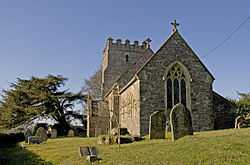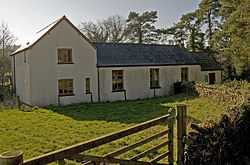Skilgate
| Skilgate | |
 St John the Baptist |
|
 Village Hall |
|
 Skilgate |
|
| Population | 96 [1] |
|---|---|
| OS grid reference | SS985275 |
| District | West Somerset |
| Shire county | Somerset |
| Region | South West |
| Country | England |
| Sovereign state | United Kingdom |
| Postcode district | TA4 |
| Police | Avon and Somerset |
| Fire | Devon and Somerset |
| Ambulance | South Western |
| EU Parliament | South West England |
| UK Parliament | Bridgwater and West Somerset |
Coordinates: 51°02′16″N 3°26′56″W / 51.0378°N 3.4490°W
Skilgate is a village and civil parish 5 miles (8 km) east of Dulverton and 8 miles (13 km) west of Wiveliscombe in the West Somerset district of Somerset, England. It has a population of 96.[1]
The parish, which covers an area of 866 ha,[1] straddles the boundary of the Exmoor National Park lying on the southern edge of the Brendon Hills, and is close to the border with Devon.
History
In the Domesday Book the village was recorded as Scheligate, possibly meaning 'the opening on the boundary'.[1] At that time it was held by Robert de Gatemore under Roger Arundel along with another manor in the parish known as Milton. They passed in the 20th century to the Ferguson Davie baronets.[2]
The parish of Skillgate was part of the Williton and Freemanners Hundred.[3]
Governance
The parish council has responsibility for local issues, including setting an annual precept (local rate) to cover the council’s operating costs and producing annual accounts for public scrutiny. The parish council evaluates local planning applications and works with the local police, district council officers, and neighbourhood watch groups on matters of crime, security, and traffic. The parish council's role also includes initiating projects for the maintenance and repair of parish facilities, as well as consulting with the district council on the maintenance, repair, and improvement of highways, drainage, footpaths, public transport, and street cleaning. Conservation matters (including trees and listed buildings) and environmental issues are also the responsibility of the council.
The village falls within the Non-metropolitan district of West Somerset, which was formed on 1 April 1974 under the Local Government Act 1972, having previously been part of Dulverton Rural District.[4] The district council is responsible for local planning and building control, local roads, council housing, environmental health, markets and fairs, refuse collection and recycling, cemeteries and crematoria, leisure services, parks, and tourism.
Somerset County Council is responsible for running the largest and most expensive local services such as education, social services, libraries, main roads, public transport, policing and fire services, trading standards, waste disposal and strategic planning.
It is also part of the Bridgwater and West Somerset county constituency represented in the House of Commons of the Parliament of the United Kingdom. It elects one Member of Parliament (MP) by the first past the post system of election, and part of the South West England constituency of the European Parliament which elects seven MEPs using the d'Hondt method of party-list proportional representation.
Religious sites
The Church of St John has a 14th-century tower, but the rest of the church was rebuilt in 1872. It has been designated by English Heritage as a Grade II* listed building.[5]
References
| Wikimedia Commons has media related to Skilgate. |
- ↑ 1.0 1.1 1.2 1.3 "Skilgate". Exmoor National Park. Retrieved 2008-02-04.
- ↑ Bush, Robin (1994). Somerset: The Complete Guide. Dovecote Press. p. 184. ISBN 1-874336-26-1.
- ↑ "Somerset Hundreds". GENUKI. Retrieved 23 October 2011.
- ↑ A Vision of Britain Through Time : Dulverton Rural District
- ↑ "Church of St John". Images of England. Retrieved 2008-02-04.
